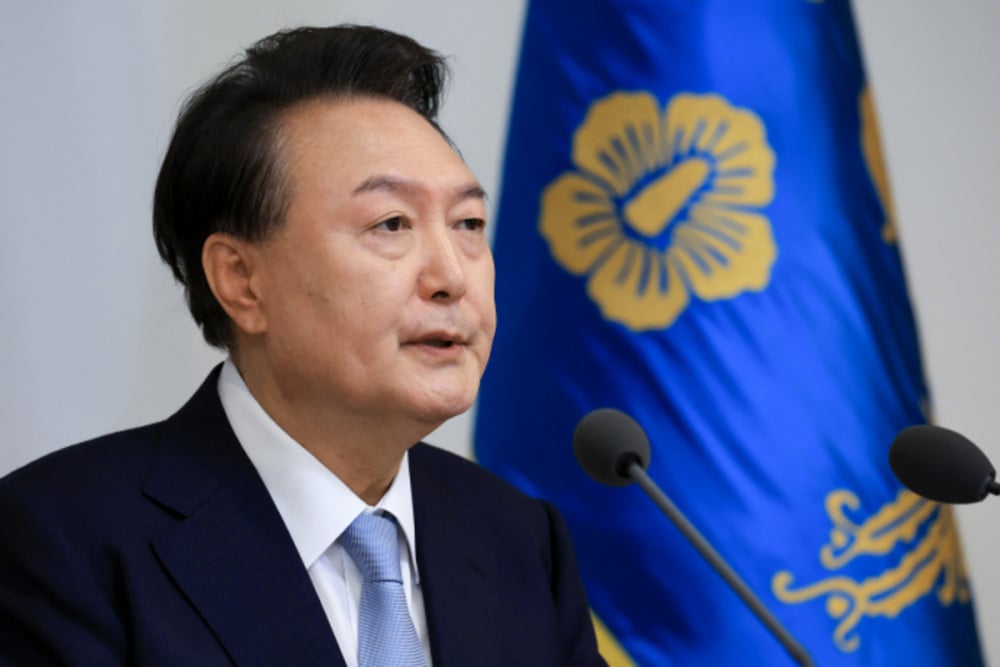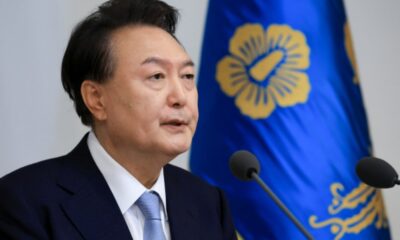General
South Korea President Yoon says he will lift martial law

On December 3, 2024, South Korean President Yoon Suk Yeol declared martial law, citing the need to eliminate “anti-state” forces and protect the nation’s constitutional order. This unprecedented move, reminiscent of South Korea’s authoritarian past, was met with swift opposition. The National Assembly convened promptly, with 190 out of 300 members present, and voted unanimously to lift the martial law declaration.
Following the parliamentary vote, President Yoon announced his intention to honor the legislature’s decision and lift martial law. He indicated that he attempted to assemble the cabinet to formalize this action but faced delays due to the early morning hours. President Yoon assured the public that he would proceed with lifting martial law as soon as the minimum required number of cabinet members could be gathered.
This series of events has intensified political tensions in South Korea, drawing criticism from both opposition parties and members of President Yoon’s conservative People Power Party.
General
Why Businesses in Cypress, TX Are Turning to Abii & Associates for Legal Guidance

As the commercial landscape in Cypress, Texas continues to expand, more local businesses are recognizing the importance of having legal protection built into their operations. From startup founders to seasoned entrepreneurs, one law firm is quickly becoming the go-to resource for business legal services: Abii & Associates.
With a growing number of small and mid-sized businesses calling Cypress home, the need for reliable, strategic legal counsel has never been greater. Abii & Associates has stepped in to fill that gap, offering tailored legal solutions for companies navigating formation, contracts, compliance, and growth challenges.
Legal Clarity for Local Business Owners
Running a successful business in Cypress, TX requires more than just a good idea. Business owners must consider how to structure their companies, protect their intellectual property, negotiate contracts, and comply with state and federal laws.
Abii & Associates provides a full range of business and corporate legal services, including:
- LLC and corporation formation
- Contract drafting and review
- Employment policies and advisory
- Commercial lease and vendor agreements
- Partnership and shareholder disputes
- Business purchases and sales
- Regulatory compliance and liability protection
“Businesses in Cypress, TX deserve legal support that’s both strategic and personal,” said a spokesperson for the firm. “We help clients make smart decisions today to avoid expensive problems tomorrow.”
Trusted by the Cypress Business Community
What sets Abii & Associates apart is their hands-on, responsive approach. Business owners report that the firm offers legal advice that’s easy to understand—and even easier to implement.
One local entrepreneur shared,
“They took the time to understand my business, not just my legal question. The advice was spot-on, and it gave me confidence moving forward.”
Abii & Associates doesn’t rely on cookie-cutter templates or generic solutions. Instead, they craft legal strategies that align with the unique structure, size, and goals of each business they serve.
Supporting Growth in Cypress, TX
Cypress continues to attract new residents and businesses, making it a key hub for economic development in the Houston metro area. Abii & Associates’ decision to expand services in the area is already making a difference for local companies looking to protect and grow their enterprises.
“We’re committed to helping businesses in Cypress, TX build on a strong legal foundation,” the firm adds. “When your legal framework is solid, your business is freer to thrive.”
To learn more about Abii & Associates’ services for Cypress business owners, visit:
👉 https://www.abiilegal.com/practice-area/business-and-corporate-lawyer-serving-cypress-texas
General
Pearland Law Firm Abii & Associates Helps Residents Navigate the Complexities of Bankruptcy

As rising debt and financial strain affect households and small businesses across Texas, one Pearland-based law firm is stepping up to offer clarity and legal relief. Abii & Associates, a multi-practice legal firm located in Pearland, has become a trusted resource for residents considering bankruptcy as a path toward financial recovery.
With a steady increase in inquiries related to debt relief, attorneys at Abii & Associates report that many Texans remain unsure about their rights, protections, and legal options when facing overwhelming financial pressure. According to the firm, bankruptcy is often misunderstood—but in the right situations, it can offer powerful protection and a fresh start.
“People often delay seeking help because of fear or stigma,” one of the attorneys at Abii & Associates shared. “But the reality is that bankruptcy, when handled properly, is a legal tool designed to help—not punish—those who are financially distressed.”
The firm regularly handles both Chapter 7 and Chapter 13 filings, providing clients with tailored guidance based on their unique financial picture. Under Chapter 7, qualified individuals may be able to discharge unsecured debts entirely, while Chapter 13 allows those with regular income to reorganize their payments and keep important assets like homes and vehicles.

One of the key advantages for local clients is that Texas law provides some of the most generous bankruptcy exemptions in the country, allowing individuals to retain more of their property than they might expect. Attorneys at Abii & Associates say many clients are surprised to learn they can file for bankruptcy and still protect their home, car, and retirement accounts.
“Every case is different, and that’s why personalized counsel is so important,” the firm explains. “We don’t offer one-size-fits-all advice. We sit down with our clients, evaluate their assets and goals, and walk them through every step of the process.”
In addition to consumer bankruptcy, the firm also advises small business owners dealing with insolvency, commercial debt, or pending lawsuits. Their goal, they say, is not only to offer legal solutions—but to preserve dignity and protect futures.
The bankruptcy team at Abii & Associates is currently accepting consultations for individuals, families, and businesses in Pearland and throughout the Houston metro area. The firm encourages anyone facing creditor harassment, foreclosure, or overwhelming debt to explore their legal options early—before the situation becomes harder to manage.
To learn more about bankruptcy services at Abii & Associates or to schedule a consultation, visit:
👉 https://www.abiilegal.com/law-firm-in-pearland-texas/bankruptcy
General
Houston Probate Attorney Providing Legal Clarity in Times of Uncertainty

Houston, TX – May 13th 2025 – In the wake of losing a loved one, families often face not just emotional grief but complex legal responsibilities. The Law Office of Udo Ezeamama is stepping forward as a trusted ally for Houston residents navigating the probate process with professionalism, compassion, and deep knowledge of Texas probate law.
As a leading probate attorney in Houston, Attorney Udo Ezeamama offers tailored legal services for individuals dealing with estate matters, whether or not the deceased left a will. From initiating probate in court to resolving disputes among heirs, the firm is committed to helping clients make informed decisions during a sensitive time.
“Probate doesn’t have to be confusing or overwhelming,” said Attorney Udo Ezeamama. “We aim to simplify the process, protect our clients’ interests, and resolve estate matters as quickly and efficiently as possible.”

The firm provides comprehensive probate services, including:
- Probate administration
- Will validation and contests
- Affidavit of heirship and heirship proceedings
- Small estate affidavit filings
- Muniment of title
- Probate litigation when disputes arise
Known for a high standard of legal ethics and client satisfaction, the Law Office of Udo Ezeamama ensures every client is treated with dignity, respect, and personal attention. The firm serves Harris County and surrounding areas, offering both in-person and virtual consultations.
About Law Office of Udo Ezeamama
The Law Office of Udo Ezeamama is a full-service law firm based in Houston, Texas, with core practice areas in probate, family law, immigration, and business law. The firm is committed to delivering outstanding legal representation while maintaining a strong focus on the needs and concerns of the individuals and families it serves.
To schedule a consultation or learn more about our probate services, visit https://www.attorneyudo.com/probate-attorneys-in-texas/ or call (832) 582-0872






















